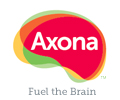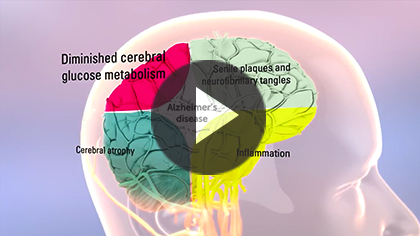What are the signs and symptoms of Alzheimer’s disease?
 There are certain changes that you can look for in your loved one1
There are certain changes that you can look for in your loved one1
One challenge is that the signs and symptoms of Alzheimer’s disease — and how the disease progresses — may not be the same for every person. Here are some of the signs and symptoms that are generally associated with Alzheimer’s disease.
Memory loss
The most noticeable symptom of early Alzheimer’s disease may be increased forgetfulness.
Nearly everyone forgets things from time to time. With Alzheimer’s disease, however, memory loss persists and gets worse over time. This makes it increasingly difficult for people to function as they used to at home, at work, or in social situations.
Signs of memory loss related to Alzheimer’s disease may include:
- Asking the same questions over and over again, repeating information, or completely forgetting previous conversations
- Forgetting important dates, appointments, and life events and not remembering that they have been forgotten later on
- Regularly forgetting where items have been placed or putting items in places that do not make any sense, such as putting the TV remote in the oven or car keys in the medicine cabinet
Increased confusion
Thinking it is wintertime in the summertime, or continually insisting that it is Sunday when it is Tuesday, may be a sign of Alzheimer’s disease.
People with the disease may not be able to correctly interpret what is happening around them or what is going on in their immediate surroundings. For example, people with Alzheimer's may understand that they are in a store, but they may not recognize that it is a drugstore or know how they got there. Over time, they may get lost in locations that were once familiar to them, like the local shopping mall.
Another sign is not being able to respond appropriately to situations that can become dangerous, such as leaving food burning on a stove or not stopping the car at a red light.
Trouble concentrating
A person with Alzheimer’s disease may have difficulty thinking or concentrating on tasks that involve numbers, such as balancing a checkbook. They may also have trouble keeping track of regular financial activities, such as managing household or business finances.
Other difficulties can include being unable to multitask or engage in activities that involve multiple steps, like planning for weekly food shopping or preparing meals that have been made many times before.
Trouble with words
People with Alzheimer’s disease may have difficulty finding the right words during work, social conversations, or any activities that involve writing. They also may have trouble identifying objects, places, and people.
It can be hard to watch a loved one struggle with tasks that were once so easy. You may want to ignore signs and symptoms, hoping that they will just go away. It may comfort you to know that early diagnosis helps give people with Alzheimer’s disease the best chance of benefiting from therapy.
Support organizations that can help
Sometimes it can help to connect with others who may also be facing the same issues and challenges as you. Learn more about support organizations that can help you build a support network and gather information.
You may also be interested in reading about how these signs and symptoms fit into the seven stages of Alzheimer’s disease.


